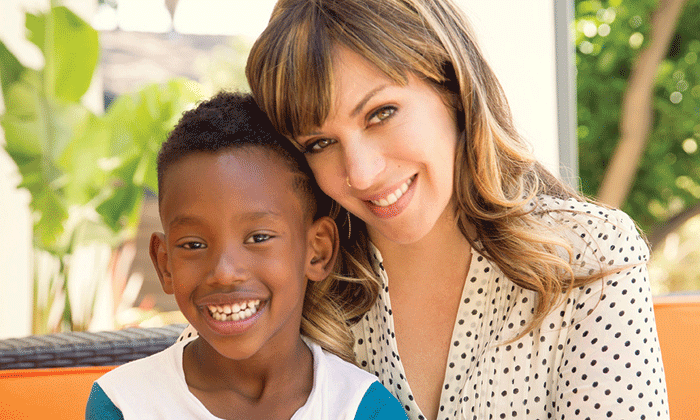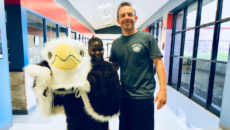In the guesthouse of a sweet forties-style ranch in Encino, our new occupational therapist (OT) puts Tariku though various physical tests: balance beam, puzzles, touch your nose, touch your toes, left side, right side. I am vindicated to learn that the former OT who “graduated” T was wrong. The new OT confirms Tariku’s diagnosis of sensory processing disorder and explains it to us with clear charts. She also discovers contributing factors that I would never have guessed. It turns out that Tariku can’t sit still not just because he has so much energy but because he literally can’t sit still—he has almost no core strength. It’s exhausting for him to hold his own torso up in a chair. When she says this, a light goes on. Of course. He couldn’t sit up unassisted until he was ten months old. All his other muscles must have developed to compensate.
One thing I notice about the new therapist is that she often refers to children with special needs as “our children,” as a way of distinguishing them from kids who are developing more typically. As in, “It’s sometimes hard for our children to handle unexpected touch.” Or, “our children have a difficult time visually organizing new environments.”
I find it comforting. It makes me feel less isolated and reminds me that children are raised by communities, not individuals. We may not have asked to be a part of this particular community—but who does? Well, some very exceptional adoptive parents I know do; but most of the rest of us generally don’t wake up and say, Wow, I’d really like to go to lots and lots of therapy with my five-year-old son until I’m so harried that I need some for myself as well. And yet here we are. We are better, stronger people for it; there is no doubt.
Here are some of the practical things we’ve put in place by the time school rolls around again:
I find a great therapist of my own. Finally.
We do “kid CrossFit” each morning in the living room—basically Tariku and Scott doing a bunch of calisthenics that focus on core work. T runs laps around the house and does sit-ups and bear crawls while Scott shouts encouragement and times him with a stopwatch. The physical exertion calms Tariku’s nervous system and also helps to balance some of the unevenly developed muscles, with the added bonus of being adorable.
We have noise-canceling headphones (Peltor Junior Earmuffs, to be specific) for him, which we begin to bring to loud and overstimulating environments. This changes our whole life. Suddenly, when we’re in the grocery store his eyes don’t glaze over. He stops ignoring and running away from us, or collapsing into a hair-trigger tantrum every ten minutes.
We give him jobs. This is probably the greatest help of all. We give him a task to focus on. When we’re at the grocery store, Scott says, “Okay, go get broccoli and an avocado and three beautiful apples.”
We give him heavy things to carry: books, backpacks, bags of groceries. It puts pressure on his joints in a way that relaxes and regulates him.
We get a trampoline.
We keep him running, keep him active, keep him breathing. We make a balance beam out of a two-by-four.
We breathe. Breathe. We play games like moving a cotton ball by blowing through a straw.
We interview candidate after candidate until we find a school aide who seems almost too good to be true. Gia (that’s Miss Gia to you) is a gentle, hip woman with a careful way of speaking and an unmistakable confidence and solidity. She has both a master’s degree and four children of her own. She came to this work when her youngest daughter began to present multiple special needs and she found she had a facility for addressing the challenges. Her daughter’s therapist, after the treatment was done, took Gia under her wing and trained her. When the school year starts up again, Gia is at T’s side.
It is tricky in all the usual ways at first, but I feel oddly unruffled. If it doesn’t work this time, we’ll know we’ve tried everything. We’ll know we need a more dedicated special needs environment of some sort and that will be okay, too.
And then.
In a week, he starts to turn it around. In two weeks, his teacher greets me not just with eye contact but with an enthusiastic hug and a wide smile. In three weeks, three weeks, he is a different child entirely.
Miss Gia would correct me. He is the same child, she’d say. The goal, she would say, is never to make Tariku not be Tariku. Tariku is amazing just how he is. She means it. She loves my child. The goal is to help him control his impulses so he can function. And that is exactly what starts to happen.
Gia teaches not just Tariku but me. I learn from her that security and routine are key for him. He needs to know what is coming and that someone has his back. We write out elaborate calendars and set timers for every transition.
When I was trying to get pregnant, I feared I was undeserving and beyond help. It was so easy to believe those things about myself. Now I look at my son and see that we are all children of God. None of us is undeserving and beyond help.
I had read every book and taken every class and practically spent our last dollar. I was beating my head against a wall unable to figure out how the healing was going to happen. Now I know you just keep hammering away at it. And then one day things shift a fraction of a degree and the entire world changes.
Three months later, Scott and I pack up the car with crafting supplies, an Ethiopian feast, decorations and paper goods, and the all-important PowerPoint presentation. You do realize they’re five, right? Scott asked me, when I was hunched over the slides late into the night. It is our family’s turn to do “International Day” at St. Stephen’s. I was unreasonably stressed about organizing the whole thing, because Ethiopia carries significance for T beyond what other kids feel for, say, Greece or China or Ireland. He has a real sense of pride and excitement about it. I want to do something super fun and engaging for the kids. I want them to get to know my son.
I sit at the front of the room with Tariku next to me.
“Ethiopia is a very special country for our family because Tariku was born there and that’s where we adopted him.”
Six hands shoot up.
What’s adoption?
Whoa. I was not expecting that one. I came with injera bread and pictures of antelope. Naively, I did not come prepared to explain what adoption is to a bunch of five-year-olds. None of these kids’ parents have explained to them what adoption is? From her perch in the corner, Miss Gia gives me a look of silent support.
Here goes.
“Families are formed in lots of different ways,” I say. “Our family was formed through adoption. Tariku didn’t grow in my belly. He grew in his birth mom’s belly and then we adopted him. So he has two moms, his birth mom and his forever mom—that’s me!”
Six more hands shoot up. Shit.
What happened to his real mom?
Are you gonna show us pictures of his real mom?
I get the on-the-spot, I-don’t-have-the-answer brain freeze, like I’ve been caught in a lie or have been asked too hard a question on an oral exam. After a long breath, I realize I actually do know the answer.
I explain that I am Tariku’s mom. That he also has a birth mom. That we are both real moms. Then I tell them these are private questions and it is up to T if and when he wants to talk about it. T looks confused. He didn’t expect all that, either. It never occurred to him that most of his friends had no idea what adoption is. I manage to shift the conversation back to Ethiopia.
All of this is upstaged by the fact that they are allowed to eat Ethiopian food with their fingers, which quickly makes it everyone’s favorite food.
Actually seeing him in the classroom, I am floored by the progress T has made over the past few months. He is still energetic and enthusiastic and dancing every five minutes, of course. He’s still T. But he can sit still and keep his hands to himself. He’s polite and raises his hand.
On our way out the door, I run into the head of the school, walking toward us down the hallway.
“It’s our little success story!” she says.
Us. A success story.
We have a few more meetings with the team and if the mood in the room were any more jubilant, we’d all be slamming shots—including the teacher (especially the teacher).
I go from talking to the head of the preschool every day to not getting an e-mail back from her for a few days at a time sometimes.
 “She forgot about us.” I say to Scott. “There are more important things on her plate. We’re falling off the map!”
“She forgot about us.” I say to Scott. “There are more important things on her plate. We’re falling off the map!”
At the meeting before spring break, they offer us a reenrollment contract to the school.



